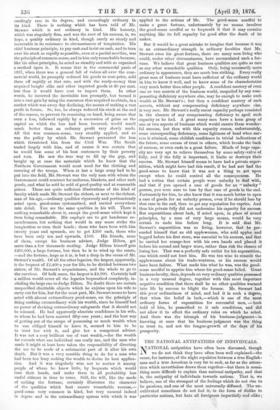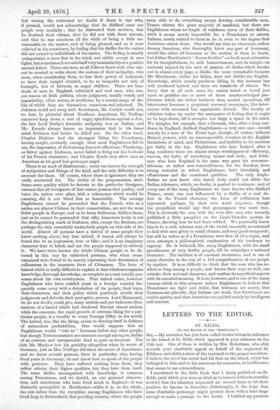THE NATIONAL ANTIPATHIES OF INDIVIDUA LS N ATIONAL antipathies have often been
discussed, though we do not think they have often been well explained—the cause, for instance, of the slight repulsion between a true English- man and a true American is very far to seek, as far as the attrac- tion which nevertheless draws them together—but there is some- thing more difficult to explain than national antipathy, and that is, the antipathy of individuals towards nations. That is, we believe, one of the strongest of the feelings which do not rise to be passions, and one of the most universally diffused. The un- cultivated sometimes do not feel it, in the form of dislike to particular nations, but hate all foreigners impartially and alike ; but among the cultivated we doubt if there is one who, if pressed, would not acknowledge that he disliked some one people very cordially ; that he distrusted their motives, that be doubted their virtues, that he did not wish them success, and that he was conscious all the while of being a little un- -reasonable in the matter, and of being pleased, and as it were relieved in his conscience, by feeling that his dislike for the nation did not extend to individuals of the nation. The feeling is usually -unimportant, a mere flaw in the mind, not visible except in rare 'lights, but sometimes it reveals itself very unmistakably as a positive mental defect. There are men, as all Editors know well, who can- not be trusted to write about the nations of their antipathy, who seem, when considering them, to lose their power of judgment, to have their insight clouded, to be as incapable not only of foresight, but of fairness, as angry children. There are hun- dreds of men in England, cultivated and cool men, who Can- not reason on Irish politics, whose judgment, usually sound, and impartiality, often serene, is overborne by a mental surge of dis- like of which they are themselves conscious and ashamed. Dr. Johnson could not away with Scotchmen, Mr. Carlyle could not, are fear, be pictorial about Northern Americans, Mr. Trollope can never keep down a sort of angry spitefulness against a Jew, the late Lord Derby's favourite antipathy was an Italian, and Mr. Froude always leaves an impression that in his inner mind Irishmen had better be killed out. On the other hand, -Charles Dickens had the strongest liking for Frenchmen, having caught, curiously enough, what most Englishmen fail to see, the impression of their strong domestic affections; Thackeray, _so bitter against Irishmen, never failed to bring out the bonhomie of his French characters ; and Charles Reade very often uses an American as his good but grotesque angel.
There is no need of illustrations ; every one knows the strength 174 antipathies and likings of the kind, and the only difficulty is to -account- for them. Of course, where there is ignorance they are -easily accounted for. The victim of the prepossession attri- butes some quality which he detests to the particular foreigner, assumes that all foreigners of that nation possess that quality, and hates the nation ever after, with a vehemence which would be -amusing, did it not blind him so lamentably. The average Englishman cannot be persuaded that the French, who as a nation are almost Chinese in their conservatism, are not the most Ackle people in Europe, and as he hates fickleness, dislikes them; just as he cannot be persuaded that silly, humorous levity is not the distinguishing mark of Irishmen, who, except the Bretons, are perhaps the only essentially melancholy people on this side of the world. Almost all persons have a hatred of some people they know nothing about, but that hatred, if traced, will always be found due to an impression, true or false ; and it is an imaginary character that is hated, and not the people supposed to embody it. We have twice known the whole Chinese people to be de- tested in this way by cultivated persons, who when cross- examined were found to be merely expressing their detestation of callousness in the incarnate form of Chinamen. The form of -hatred which is really difficult to explain is that which accompanies knowledge, thorough knowledge, as complete as a man usually pos- sesses about his own countrymen. That hatred exists, however. Englishmen who have resided years in a foreign country fre- quently come away with a detestation of its people, their ways, their characters, and their policy which positively clouds their judgments and disturbs their perceptive powers. Lord Hammond, we do not doubt, could give many serious and yet ludicrous illus- trations of a hatred which had rendered Envoys almost useless, while the converse, the rapid growth of extreme liking for a par- ticular people, is a trouble to every Foreign Office in the world. 'The hatred, too, like the liking, seems to develop itself in defiance 'of antecedent probabilities. One would suppose that an Englishman would "take to" Germans before any other people, but though Teutonomaniacs are common enough among us, dislike of an extreme and unreasonable kind is quite as frequent. The rdate Mr. Mayhew lost his geniality altogether when he wrote of Germans, just as Mrs. Trollope did when she wrote of Americans ; and we know several persons, three in particular, who, having lived years in Germany, do not know how to speak of the people with patience. They have suffered nothing from them, they rather admire their higher qualities, but they hate them hard. The same dislike accompanied with knowledge is common among Frenchmen, and we should, on our personal observa- tion, add Americans, who have lived much in England—it was distinctly perceptible in Hawthorne—while it is, on the whole, the rule rather than the exception among Englishmen who have lived long in Switzerland, that puzzling country, where the people seem able to do everything except develop considerable men. France charms the great majority of mankind, but there are Englishmen whom no length of residence cures of their dislike, while it seems nearly impossible for a Frenchman to esteem Italians, nearly related to them as he is, even to the degree that Austrians esteem them. One would say that an observant, rather dreamy American, who thoroughly knew any part of Germany, would like either all Germans or the section of them be knew, but Julian Havrthorne's "Saxon Studies"--a book most attractive for its thoughtfulness, its acid humorousness, and its insight—is seriously injured by the sort of passion of dislike which breaks out in almost every page, a dislike the more remarkable because Mr. Hawthorne, unlike his father, does not dialike the English. Knowledge, which usually produces liking, in this instance has only produced hatred, and there are hundreds of others. We fancy that in all such cases the nation hated or loved jars upon or gratifies one or more of those unacknowledged pre-. ferences which are rather instincts than mental operations, till intercourse becomes a perpetual renewed annoyance, like inter- course with esteemed but unpalatable friends. The faculty of criticism wakes up under the annoyance of feeling that it ought to be kept down, till it occupies too large a apace in the mind. We imagine, for example, that a German, who, after a long resi- dence in England, disliked Englishmen—a very rare case—would usually be a man of the Heine type, though, of course, without Heine's powers, with an unconquerable vexation at the English limitations of mind, and Philistinism, and inability to let emotion get fairly to the top. Englishmen who hate Ireland after a long residence there are almost always worshippers of efficiency, success, the habit of correlating means and ends ; and Irish- men who hate England in the same way pant for unreason- ableness, or rather non-reasonableness, for the freedom from strong restraint in which Englishmen hold friendship and effusiveness iind the emotional qualities. The only Anglo- Italian we ever knew who hated Italy could not abide the Italian tolerance, which, no doubt, is pushed to weakness ; and of every one of the many Englishmen we have known who disliked France, every one was influenced by a dislike of a real de- fect in the French character, the form of selfishness best expressed, perhaps, by their own word exigeance, though the prejudiced would say that graspingness was more true. This is obviously the case with the very able man who recently published a little pamphlet on the Land-Transfer system in France, showing how he had been robbed. We personally know him to be a cool, tolerant man of the world, unusually accustomed to deal with men given to small chicane, and very good-tempered ; but still he writes as if a Frenchman were first of all a rogue, and even attempts a philosophical explanation of his tendency to roguery. He is irritated, like many Englishmen, with the small greedinesses of very thrifty people, till he misjudges a national character. The incident is of constant recurrence, and is one of many obstacles in the way of a full comprehension of one people by another. It is so difficult to think that the man who has re- sided so long among a people, and knows their ways so well, can mistake their national character, and confuse its superficial aspects with its essential meaning. It is so, however, and is one of the many reasons which to this moment induce Englishmen to believe that Frenchmen are light and fickle, that Irishmen are merry, that Germans are placable, that Italians are weak, that Scotchmen are cool to apathy, and that Americans are guided mainly by intelligent self-interest.



































 Previous page
Previous page